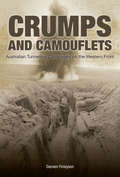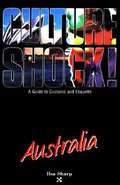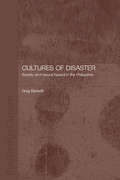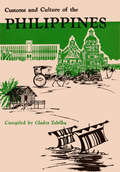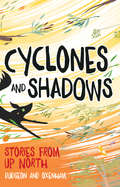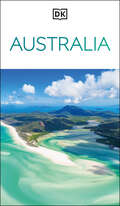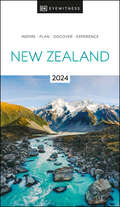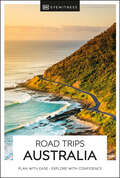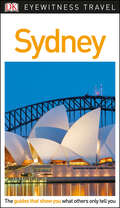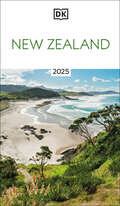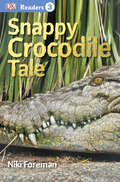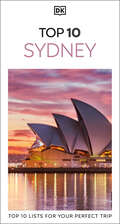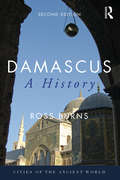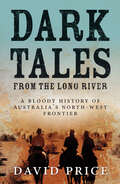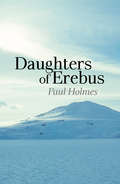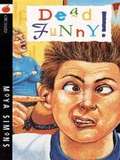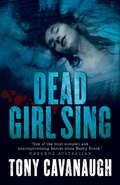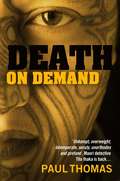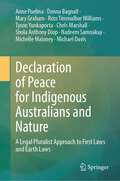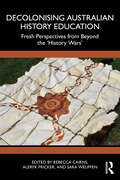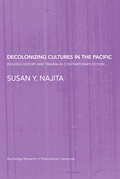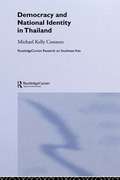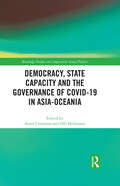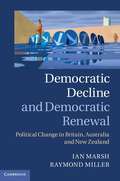- Table View
- List View
Crumps and Camouflets: Australian Tunnelling Companies on the Western Front
by Damien FinlaysonBelow the shattered ground that separated the British and German infantry on the Western Front in World War I, an unseen and largely unknown war was raging, fought by miners, 'tunnellers' as they were known. They knew at any moment their lives could be extinguished without warning by hundreds of tonnes of collapsed earth and debris.
Culture Shock! Australia
by Ilsa SharpIn addition to explaining Australia to newcomers and visitors in the hope of bridging culture gaps and improving the chances of mutual empathy and friendship, it is the author's wish that Australians will, through this book, see themselves through outsiders' eyes.
Cultures of Disaster: Society and Natural Hazard in the Philippines
by Greg BankoffIn this fascinating and comprehensive study, Greg Bankoff traces the history of natural hazards in the Philippines from the records kept by the Spanish colonisers to the 'Calamitous Nineties', and assesses the effectiveness of the relief mechanisms that have evolved to cope with these occurrences. He also examines the correlation between this history of natural disasters and the social hierarchy within Filipino society. The constant threat of disaster has been integrated into the schema of daily life to such an extent that a 'culture of disaster' has been formed.
Customs and Culture of the Philippines
by Gladys ZabilkaGaldys Zabilka, author of Customs and Culture of Okinawa, has once again created an informal and interesting compilation for the overseas traveler or the armchair tourist, this time on the colorful Philippines. The reader will be introduced to quaint customs, tourist attractions, folk songs, foods, and sports along with a general review of Philippine history and racial background. Almost very aspect of Filipino life is touched upon in this handy little volume. Delightful illustrations for each chapter were done by M. Kuwata. Musical scores of several Philippine folk songs are included in the last chapter.
Cyclones and Shadows: Stories from Up North
by Darlene Oxenham Pat Dudgeon Laura Dudgeon Sabrina DudgeonThis collection draws together four tales for younger readers from the Waarda series of Indigenous stories, first edited by acclaimed author Sally Morgan. Two stories feature Lilli and her magical companion, Shadow. The next two stories are about Annie, who learns how important ingenuity and strong family ties are when living in the remote community of Useless Loop. Drawing on the authors' own experiences, these charming tales are illustrated with black-and-white line drawings, and are a great way to introduce young readers to the world of contemporary Indigenous storytelling.
DK Australia (Travel Guide)
by DK TravelGet closer to Australia with DK EyewitnessSnorkelling on the Great Barrier Reef. Dining out with a view of the Sydney Opera House. Strolling through trendy Melbourne. For a vacation to remember, Australia is hard to beat. Whatever your dream trip involves, this DK Eyewitness travel guide is the perfect companion.Our updated guide brings Australia to life, transporting you there like no other travel guide does with expert-led insights, trusted travel advice, detailed breakdowns of all the must-see sights, photographs on practically every page, and our hand-drawn illustrations, which take you inside the country's sights and neighborhoods.You'll discover:our pick of Australia's must-sees and top experiencesbeautiful photography and detailed illustrations, taking you to the heart of Australiathe best spots to eat, drink, shop and staydetailed maps and walks which make navigating the region easyeasy-to-follow itinerariesexpert advice: get ready, get around and stay safecolor-coded chapters to each part of Australiaa lightweight format, so you can take it with you wherever you goWant the best of Sydney in your pocket? Try Top 10 Sydney.
DK Eyewitness New Zealand (Travel Guide)
by DK EyewitnessWhether you're seeking your next adrenaline-fix, the best place to taste traditional Maori cuisine, or the perfect geothermal pool to unwind in, your DK Eyewitness travel guide makes sure you experience all that New Zealand has to offer.An explosion of dramatic scenery, this far-flung Pacific island has it all: mammoth mountains, icy-blue glacial lakes, unspoiled coastlines, idyllic vineyards and cool, cultural cities. From the subtropical kauri forests of the North Island to the remote fjords of the South Island, New Zealand offers countless opportunities for adventure.Our updated guide brings New Zealand to life, transporting you there like no other travel guide does with expert-led insights, trusted travel advice, detailed breakdowns of all the must-see sights, photographs on practically every page, and our hand-drawn illustrations which place you inside the country&’s iconic buildings and neighborhoods. DK Eyewitness New Zealand is your ticket to the trip of a lifetime. Inside DK Eyewitness New Zealand you will find: - A fully-illustrated top experiences guide: our expert pick of New Zealand&’s must-sees and hidden gems- Accessible itineraries to make the most out of each and every day- Expert advice: honest recommendations for getting around safely, when to visit each sight, what to do before you visit, and how to save time and money- Color-coded chapters to every part New Zealand, from Northland to Southland, the Auckland to Canterbury- Practical tips: the best places to eat, drink, shop and stay- Detailed maps and walks to help you navigate the region country easily and confidently - Covers: The North Island, Auckland, Northland, The Central North Island, Wellington and the South, Marlborough and Nelson, Canterbury and the West Coast, Otago and Southland. Travelling around Oceania? Look out for our DK Eyewitness Australia.About DK Eyewitness: At DK Eyewitness, we believe in the power of discovery. We make it easy for you to explore your dream destinations. DK Eyewitness travel guides have been helping travellers to make the most of their breaks since 1993. Filled with expert advice, striking photography and detailed illustrations, our highly visual DK Eyewitness guides will get you closer to your next adventure. We publish guides to more than 200 destinations, from pocket-sized city guides to comprehensive country guides. Named Top Guidebook Series at the 2020 Wanderlust Reader Travel Awards, we know that wherever you go next, your DK Eyewitness travel guides are the perfect companion
DK Eyewitness Road Trips Australia (Travel Guide)
by DK EyewitnessWith its ever-changing landscapes, Australia is the perfect destination for a leisurely road trip. It's yours to explore with Road Trips Australia, our redesigned and newly updated guide containing 22 drives across the country, from the coastal roads of the southwest to the red-dirt tracks of the outback.Packed with insider tips and information, this easy-to-use guide reveals Australia at its best: spectacular sights, hidden gems and authentic local experiences. We've also worked hard to make sure our information is as up-to-date as possible following the COVID-19 outbreak. DK Eyewitness Road Trips Australia is your ticket to the trip of a lifetime. Inside DK Eyewitness Road Trips Australia you will find: - 22 easy-to-follow driving tours, each lasting one to seven days- A laminated pull-out road map of Australia helping you navigate with ease- Walks, delightful detours and activities to do along the way, plus you'll savor the best local -experiences with our pick of the most authentic places to stay, eat and shop- Practical tips: rules of the road, detailed directions and driving tips- Detailed maps and walks to help you navigate the country easily and confidently - Covers: Queensland, the Northern Territory, South Australia, Victoria, Tasmania and moreAbout DK Eyewitness: At DK Eyewitness, we believe in the power of discovery. We make it easy for you to explore your dream destinations. DK Eyewitness travel guides have been helping travelers to make the most of their breaks since 1993. Filled with expert advice, striking photography and detailed illustrations, our highly visual DK Eyewitness guides will get you closer to your next adventure. We publish guides to more than 200 destinations, from pocket-sized city guides to comprehensive country guides. Named Top Guidebook Series at the 2020 Wanderlust Reader Travel Awards, we know that wherever you go next, your DK Eyewitness travel guides are the perfect companion.
DK Eyewitness Travel Guide Sydney (Travel Guide)
by DK EyewitnessDK Eyewitness Travel Guide: Sydney is your in-depth guide to the very best of Sydney. Take in the major sights, from the Sydney Opera House to the Taronga Zoo; go on a boat tour for your chance to cruise on the sparkling waters of Sydney Harbour; or simply soak up the sun on the white sands of Bondi Beach.Discover DK Eyewitness Travel Guide: Sydney: • Detailed itineraries and "don't-miss" destination highlights at a glance. • Illustrated cutaway 3-D drawings of important sights. • Floor plans and guided visitor information for major museums. • Free, color pull-out map (print edition) marked with sights, a selected sight and street index, public transit map, practical information on getting around, and a distance chart for measuring walking distances . • Guided walking tours, local drink and dining specialties to try, things to do, and places to eat, drink, and shop by area. • Area maps marked with sights and restaurants . • Detailed city maps include street finder index for easy navigation . • Insights into history and culture to help you understand the stories behind the sights. • Suggested day-trips and itineraries to explore beyond the city . • Hotel and restaurant listings highlight DK Choice special recommendations. With hundreds of full-color photographs, hand-drawn illustrations, and custom maps that illuminate every page, DK Eyewitness Travel Guide: Sydney truly shows you this city as no one else can.Recommend: For a pocket guidebook to Sydney, check out DK Eyewitness Travel Guide: Top 10 Sydney, which is packed with dozens of top 10 lists, ensuring you make the most of your time and experience the best of everything.
DK New Zealand (Travel Guide)
by DK TravelWhether you're seeking your next adrenaline-fix, the best place to taste traditional Maori cuisine, or the perfect geothermal pool to unwind in, your DK Eyewitness travel guide makes sure you experience all that New Zealand has to offer.An explosion of dramatic scenery, this far-flung Pacific island has it all: mammoth mountains, icy-blue glacial lakes, unspoiled coastlines, idyllic vineyards and cool, cultural cities. From the subtropical kauri forests of the North Island to the remote fjords of the South Island, New Zealand offers countless opportunities for adventure.Our updated guide brings New Zealand to life, transporting you there like no other travel guide does with expert-led insights, trusted travel advice, detailed breakdowns of all the must-see sights, photographs on practically every page, and our hand-drawn illustrations which place you inside the country’s iconic buildings and neighborhoods. DK Eyewitness New Zealand is your ticket to the trip of a lifetime. Inside DK Eyewitness New Zealand you will find: - A fully-illustrated top experiences guide: our expert pick of New Zealand’s must-sees and hidden gems- Accessible itineraries to make the most out of each and every day- Expert advice: honest recommendations for getting around safely, when to visit each sight, what to do before you visit, and how to save time and money- Color-coded chapters to every part New Zealand, from Northland to Southland, the Auckland to Canterbury- Practical tips: the best places to eat, drink, shop and stay- Detailed maps and walks to help you navigate the region country easily and confidently - Covers: The North Island, Auckland, Northland, The Central North Island, Wellington and the South, Marlborough and Nelson, Canterbury and the West Coast, Otago and Southland.Travelling around Oceania? Look out for our DK Eyewitness Australia.About DK Eyewitness:At DK Eyewitness, we believe in the power of discovery. We make it easy for you to explore your dream destinations. DK Eyewitness travel guides have been helping travellers to make the most of their breaks since 1993. Filled with expert advice, striking photography and detailed illustrations, our highly visual DK Eyewitness guides will get you closer to your next adventure. We publish guides to more than 200 destinations, from pocket-sized city guides to comprehensive country guides. Named Top Guidebook Series at the 2020 Wanderlust Reader Travel Awards, we know that wherever you go next, your DK Eyewitness travel guides are the perfect companion
DK Readers L3: Snappy Crocodile Tale (DK Readers Level 3)
by Niki ForemanFor kids who like learning about crocodiles, or who are interested in Australia and Australian wildlife, comes Snappy Crocodile Tale, a DK Reader designed to improve reading skills while keeping kids engaged and entertained. In Snappy Crocodile Tale, we follow the adventures of Chris Croc all the way from birth through his time as king of the river! Chris Croc lives at Kakadu National Park in Australia, and through his journey we meet more Australian wildlife through the crocodile's encounters with them and find out about these fascinating but deadly creatures. Develop your child's reading skills with DK Readers, a multi-level reading program designed to capture your child's interest while developing reading skills and general knowledge. A wide variety of subjects allows you to choose a topic that interests your child and develop reading skills around it. Children ages 4 through 9 will find the perfect books for their appropriate reading levels to develop the reading skills needed to improve school projects and independent reading.
DK Readers L3: Snappy Crocodile Tale (DK Readers Level 3)
by Niki ForemanFor kids who like learning about crocodiles, or who are interested in Australia and Australian wildlife, comes Snappy Crocodile Tale, a DK Reader designed to improve reading skills while keeping kids engaged and entertained. In Snappy Crocodile Tale, we follow the adventures of Chris Croc all the way from birth through his time as king of the river! Chris Croc lives at Kakadu National Park in Australia, and through his journey we meet more Australian wildlife through the crocodile's encounters with them and find out about these fascinating but deadly creatures. Develop your child's reading skills with DK Readers, a multi-level reading program designed to capture your child's interest while developing reading skills and general knowledge. A wide variety of subjects allows you to choose a topic that interests your child and develop reading skills around it. Children ages 4 through 9 will find the perfect books for their appropriate reading levels to develop the reading skills needed to improve school projects and independent reading.
DK Top 10 Sydney (Pocket Travel Guide)
by DK TravelDK Eyewitness Travel Guide: Top 10 Sydney is your pocket guide to the very best of the city of Sydney. Make the most of your trip to Sydney with our Top 10 Travel Guide, packed with insider trips, the best hotels for every budget, and the most fun places to travel or to take children in the city. From must-see museums and galleries to the greatest beaches and pools, you'll find it all in our guide. Take scenic excursions to see architecture, check out venues for music, dance, and theater, and visit Sydney's sporting venues. Packed with culture and activities, our guide to Sydney will make your trip extraordinary and unforgettable. Discover DK Eyewitness Travel Guide: Top 10 Sydney True to its name, this Top 10 guidebook covers all major sights and attractions in easy-to-use "top 10" lists that help you plan the vacation that's right for you. "Don't miss" destination highlights. Things to do and places to eat, drink, and shop by area. Free, color pull-out map (print edition), plus maps and photographs throughout. Walking tours and day-trip itineraries. Traveler tips and recommendations. Local drink and dining specialties to try. Museums, festivals, outdoor activities. Creative and quirky best-of lists and more. The perfect pocket-size travel companion: DK Eyewitness Travel Guide: Top 10 Sydney Recommended: For an in-depth guidebook to Australia, check out DK Eyewitness Travel Guide: Australia, which offers the most complete cultural coverage of Australia; 3-D cross-section illustrations of major sights and attractions; thousands of photographs, illustrations, and maps; and more.
Damascus: A History (Cities of the Ancient World)
by Ross BurnsDamascus, first published in 2005, was the first account in English of the history of the city, bringing out the crucial role it has played at many points in the region’s past. It traces the story of this colourful, significant and complex city through its physical development, from the its emergence in around 7000 BC through the changing cavalcade of Aramaean, Persian, Greek, Roman, Byzantine, Arab, Turkish and French rulers to independence in 1946. This new edition has been thoroughly updated using recent scholarship and includes an additional chapter placing the events of the Syrian post-2011 conflict in the context of the city’s tumultuous experiences over the last century. This volume is a must-read for anyone interested in the sweep of Syrian history and archaeology, and is an ideal partner to Burns’ Aleppo (2016). Lavishly illustrated, Damascus: A History remains a unique and compelling exploration of this fascinating city.
Dark Tales from the Long River: A Bloody History of Australia's North-west Frontier
by David PriceFrom searches for serial killers and missing persons to the persecution of migrants and Aboriginal people, David Price takes us back to a time when the line between lawmakers and criminals was lightly drawn. Based on a wide array of contemporaneous accounts of life in the Gascoyne, these sometimes shocking, sometimes disturbing true crime stories depict an era when laws served to maintain order rather than to secure justice. Dark Tales from the Long River offers a window into an evolving history of colonisation that is still struggling into the light.
Daughters of Erebus
by Paul HolmesHow 287 people died in the air crash on Mt Erebus. What caused the crash and who covered it up
Dead Funny! (Danny Thompson #4)
by Moya Simons"You're bright red on your front and your back is dead white. Your face looks like you've been caught in a brushfire and your lips have blisters on them. Other than that you're fine." This is not Dead Funny. This is not even slightly funny. Danny won't impress Mandy Miller looking like a flame grilled steak! But it is Dead Funny when baby Bub-Tub eats snobby Mrs Fedderpot's precious diamond ring. Or when Helen the Horrible's lips swell up like rubber rings before her big date. Or when Danny's family try to survive for all of 48 hours without TV! Danny Thompson gets lots to laugh about and a bit to cry about in this hilarious collection of stories about the trials and tribulations of a normal 12-year-old boy. All of the four books in the Danny Thompson series are in the Bookshare library and they're all some of the funniest books you'll ever read. Danny wants to get along in sixth grade as long as he doesn't have to work too hard. He wants to get along with his dribbling, leaky, baby sister as long as he doesn't have to smell her. He wants to get along with his friends, even some girls, as long as he doesn't embarrass himself. As hard as he tries to steer clear of trouble, Danny gets stuck in embarrassing messes every time he turns around. Don't miss the laughs in the Danny Thompson books including #1. Dead Meat, #2. Dead Average and #3. Dead worried.
Dead Girl Sing
by Tony Cavanaugh'One of the most complex and uncompromising heroes since Harry Bosch' - Weekend AustralianWorld-class crime writing from a brilliant Australian author.Darian Richards knew he should have let the phone keep ringing. But more than two decades as a cop leaves you with a certain outlook on life. No matter how much he tried to walk away, something, or someone, kept bringing him back to his gun.One phone call. Two dead girls in a shallow water grave. And a missing cop to deal with. Something bad is happening on the Gold Coast glitter strip. Amongst the thousands of schoolies and the usual suspects, someone is preying on beautiful young women. No one has noticed. No one knows why.Darian looked into the eyes of those two dead girls. The last person to do that was their killer. He can't walk away. He will find out why.Tony Cavanaugh is an Australian writer and producer of film and television with over thirty years' experience in the industry. Dead Girl Sing is his second book featuring former cop Darian Richards and follows on from the acclaimed crime thriller Promise.The Darian Richards SeriesPromiseDead Girl SingThe Soft Touch (Short Story)The Train RiderKingdom of the Strong
Death on Demand
by Paul ThomasMaori cop Tito Ihaka, "unkempt, overweight, intemperate, unruly, unorthodox and profane ", is a stubborn investigator with an uncanny instinct for the truth. He hunts a shadowy hit-man who could have several notches on his belt, including that of an undercover cop. To complicate matters Ihaka becomes involved with a female suspect who could hold the key to everything.
Declaration of Peace for Indigenous Australians and Nature: A Legal Pluralist Approach to First Laws and Earth Laws
by Michael Davis Mary Graham Michelle Maloney Tyson Yunkaporta Anne Poelina Donna Bagnall Ross Timmulbar Williams Chels Marshall Shola Anthony Diop Nadeem SamnakayThis groundbreaking book delves into the lived experiences and collective wisdom of Indigenous communities impacted by colonialism. Through collaborations with non-Indigenous colleagues, this book seeks to inform current legal practices and advocate for a transformative shift toward justice, equity, and the recognition of First Law and Earth-centered law.By presenting Indigenous stories as case studies and incorporating the collective wisdom gained through extensive discussions and exchanges with non-Indigenous colleagues, the authors highlight the ways in which Australian law falls short in upholding holistic principles and fails to align with First Law and Earth-centered law. The book invites readers to consider alternative legal futures that are rooted in respect, justice, and the well-being of both Indigenous peoples and the natural environment. Through its thought-provoking analysis, literature reviews, and insights from Indigenous leaders, this book servesas a powerful resource for legal practitioners, policymakers, scholars, and anyone passionate about social justice and environmental sustainability. The book aims to ignite meaningful dialogue and inspire concrete actions to address the historical injustices faced by Indigenous peoples while fostering a more inclusive and equitable legal framework for the generations to come.
Decolonising Australian History Education: Fresh Perspectives from Beyond the ‘History Wars’
by Rebecca Cairns Sara Weuffen Aleryk FrickerThis book is the first of its kind to showcase a range of fresh and expert perspectives on decolonising history education in Australia. The research-informed chapters by First Nations and non-Indigenous educators and scholars provide guidance on applying practical strategies for decolonising learning and teaching, and moving beyond the ‘history wars’.History has long been the most contentious area of education in Australia. This book tackles the narrow and overtly politicised ‘history wars’ debates and foregrounds the need to re-examine impacts of settler-colonialism on Australia’s history. First-hand knowledge and much-needed teaching practices are presented, demonstrating how decolonisation can be put into action through Australian history education. The chapters present a range of perspectives from the early years right through to higher education settings and argues that there is an increased need for greater awareness, appreciation, and willingness to explore and engage with multiple narratives of truth-telling that are so often contested. Readers are guided to discover how this translates to classroom practice through unique, provocative, and research-informed strategies that foreground applied decolonising approaches.Combining theoretical perspectives and practical ideas, this book is an essential resource to support pre- and in-service teachers, in all education contexts, in navigating the decolonisation of Australian history education. This makes it an important contribution to local, as well as global, decolonising efforts.
Decolonizing Cultures in the Pacific: Reading History and Trauma in Contemporary Fiction (Routledge Research in Postcolonial Literatures #Vol. 14)
by Susan Y. NajitaIn Decolonizing Cultures in the Pacific, Susan Y. Najita proposes that the traumatic history of contact and colonization has become a crucial means by which indigenous peoples of Oceania are reclaiming their cultures, languages, ways of knowing, and political independence. In particular, she examines how contemporary writers from Hawai‘i, Samoa, and Aotearoa/New Zealand remember, re-tell, and deploy this violent history in their work. As Pacific peoples negotiate their paths towards sovereignty and chart their postcolonial futures, these writers play an invaluable role in invoking and commenting upon the various uses of the histories of colonial resistance, allowing themselves and their readers to imagine new futures by exorcising the past. Decolonizing Cultures in the Pacific is a valuable addition to the fields of Pacific and Postcolonial Studies and also contributes to struggles for cultural decolonization in Oceania: contemporary writers’ critical engagement with colonialism and indigenous culture, Najita argues, provides a powerful tool for navigating a decolonized future.
Democracy and National Identity in Thailand (Rethinking Southeast Asia #Vol. 7)
by Michael Kelly ConnorsThis book seeks to illuminate how Thai elites have used democracy as an instrument for order and discipline. Drawing on interviews, numerous Thai language sources, and critical theory, the author reveals a remarkable adaptation of the idea of democracy in the Thai context. Connors shows how elites have drawn on Western political theory to design projects to create modern citizens. He argues that it is possible to see the idea and practice of elite liberal democracy in Thailand, and elsewhere, as a key ideological resource in the project of securing hegemony over undisciplined populations. In this perspective the ideas of civil society, civic virtue, social capital and democracy itself are all part of the weaponry deployed in an effort to create 'good citizens', who act as guardians of the elite defined common good.
Democracy, State Capacity and the Governance of COVID-19 in Asia-Oceania (Routledge Studies on Comparative Asian Politics)
by Aurel Croissant Olli HellmannThis book examines the public health responses to the COVID-19 pandemic in the Asia-Oceania region and their implications for democratic backsliding in the period January 2020 to mid-2021. The contributions discuss three key questions: How did political institutions in Asia-Oceania create incentives for effective public health responses to the COVID-19 outbreak? How did state capacities enhance governments’ ability to implement public health responses? How have governance responses affected the democratic quality of political institutions and processes? Together, the analyses reveal the extent to which institutions prompted an effective public health response and highlights that a high-capacity state was not a necessary condition for containing the spread of COVID-19 during the early phase of the pandemic. By combining quantitative and qualitative analyses, the volume also shows that the effect of the COVID-19 pandemic on the quality of democratic institutions has been uneven across Asia-Oceania. Guided by a comprehensive theoretical framework, this will be an invaluable resource for scholars and students of political science, policy studies, public health and Asian studies.
Democratic Decline and Democratic Renewal
by Ian Marsh Raymond MillerThe story of liberal democracy over the last half century has been a triumphant one in many ways, with the number of democracies increasing from a minority of states to a significant majority. Yet substantial problems afflict democratic states, and while the number of democratic countries has expanded, democratic practice has contracted. This book introduces a novel framework for evaluating the rise and decline of democratic governance. Examining three mature democratic countries – Britain, Australia and New Zealand – the authors discuss patterns of governance from the emergence of mass democracy at the outset of the twentieth century through to its present condition. The shared political cultures and institutional arrangements of the three countries allow the authors to investigate comparatively the dynamics of political evolution and the possibilities for systemic developments and institutional change.
